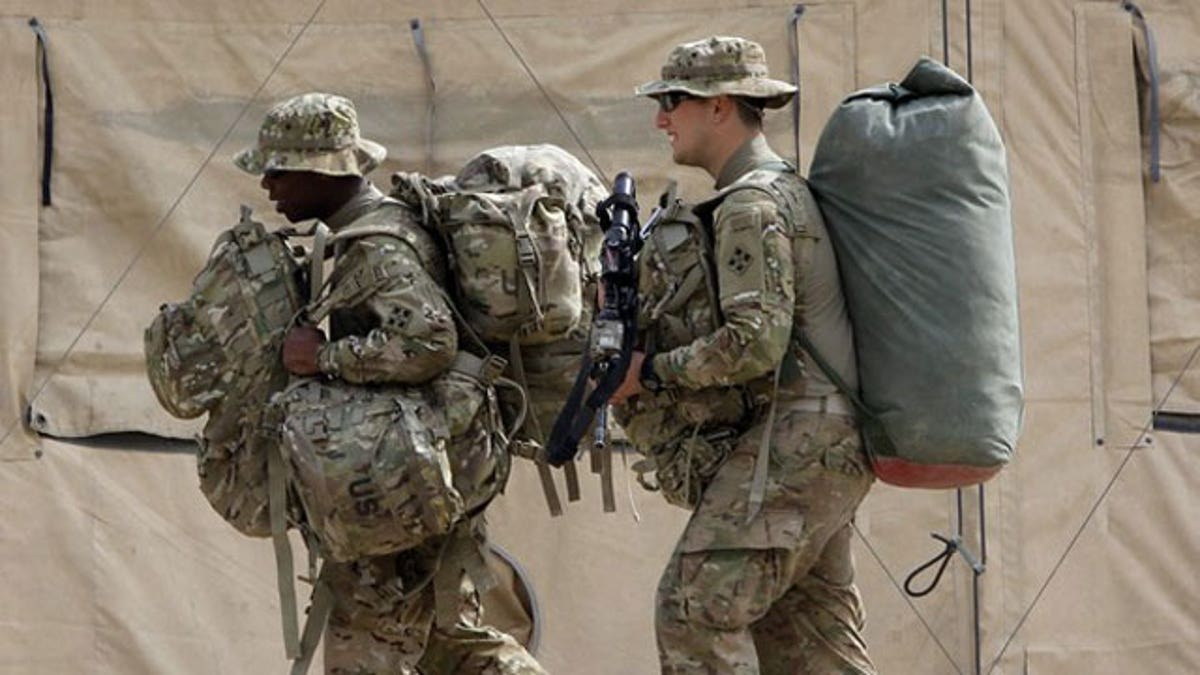
March 18, 2012: U.S. Army soldiers from 3rd Squadron, 61st Cavalry Regiment arrive for the beginning of their deployment at Forward Operating Base Joyce in Kunar province, eastern Afghanistan. (Reuters)
WASHINGTON – The top U.S. commander in Afghanistan says efforts to hand over security to the Afghans and wind down the decade-plus war are on track despite anger over a U.S. soldier's alleged massacre of Afghan civilians and the burning of Korans.
Marine Gen. John Allen, in testimony prepared for the House Armed Services Committee, gave no hint of an accelerated timetable for withdrawing U.S. combat troops in the face of increasing political and public pressure to end the military mission. Opinion polls show a growing number of Americans say the United States should bring home the 90,000 troops now in the country. Afghan President Hamid Karzai said last week he was at "the end of the rope" over civilian deaths, and demanded that U.S. troops leave local villages.
The current U.S. plan calls for a drawdown of 23,000 American troops by the end of September and a complete withdrawal by December 2014, when Afghan forces are to take charge of the country's security.
"I wish I could tell you that this war was simple, and that progress could easily be measured," Allen said. "But that's not the way of counterinsurgencies. They are fraught with success and setbacks, which can exist in the same space and time, but each must be seen in the larger context of the overall campaign. And I believe that the campaign in on track."
Allen's appearances before Congress -- he will testify before a Senate committee Thursday -- are the first since a suspected shooting spree by a U.S. soldier killed 16 Afghan civilians, including women and children, and the Quran burnings that touched off riots. The Associated Press obtained a copy of his testimony.
Allen insisted that the U.S. and its coalition forces are moving ahead in ensuring that Afghanistan doesn't revert to a terrorist haven and transferring the security lead to the Afghans. The forces, he said, are meeting the commitments spelled out in the overall withdrawal plan hammered out at the conference in Lisbon in November 2010.
Former Secretary of State Condoleezza Rice says Tuesday that U.S. policymakers must "keep our nerve" in Afghanistan.
"We just have to remember what Afghanistan was like 10 years ago," when the Taliban were in charge, she said, adding that the United States should focus heavily on training Afghan security forces because "we can't afford to leave Afghanistan to the Taliban and the terrorists."
In the past year, Afghan security forces have expanded from 276,000 to 330,000 and will achieve their goal of full strength before an October deadline. This will allow the United States to withdraw the remaining 23,000 American surge forces while pressuring the Taliban to reconcile.
But Allen acknowledged recent setbacks, including the violence stemming from the Quran burnings. All told, 32 Afghans died in the riots and more were hurt. Sixty coalition troops from six countries have been killed since January. Allen said 13 have been killed at the hands of "what appears to have been Afghan security forces, some of whom were motivated, we believe, in part by the mishandling of religious materials."
He said the military was investigating the murder of "16 innocent Afghan civilians at the hands of a U.S. service member." Some in Afghanistan have questioned whether the accused service member, identified as Army Sgt. Robert Bales, acted alone, but Allen made clear he was referring to a single individual.
Allen faced a divided and war-weary Congress more than 10 years after the Sept. 11 terrorist attacks and nearly a year after the killing of al-Qaida leader Osama bin Laden, an achievement some lawmakers argue should have ended the U.S. combat mission.
In his opening statement, Rep. Howard "Buck" McKeon, chairman of the House panel, urged caution in discussing the withdrawal of U.S. forces, arguing that with "our eyes on the exit" it may be difficult for the Americans to achieve their goals.
"What's more, in the absence of sustained, public campaign to support the mission in Afghanistan -- from the White House on down -- many have begun to question what we're fighting for," McKeon, R-Calif., said in acknowledging the divisions in Congress and the nation.
Rep. Adam Smith, D-Wash., the top Democrat on the panel, is among those in Congress pressing for a faster withdrawal.
"The solution to this dilemma, that over time our large scale presence will have diminishing returns, is simple -- we should accelerate the plans we have already made. The NATO Lisbon Conference of 2010 laid out a realistic plan for transition. Our challenge now is to look for ways to implement it as fast as we responsibly can," Smith said.




